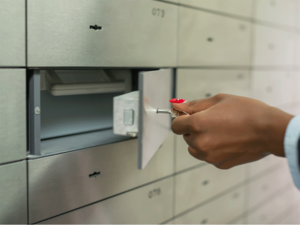Synopsis
As per RBI’s revised guidelines on lockers, the revised Locker Agreement is to be executed by all the existing locker holders. The RBI has set December 31, 2023 deadline to execute revised locker agreements, in a staggered manner.
 Getty Images
Getty ImagesMany individuals, companies, Partnership Firms, Limited Companies, Associations and Clubs avail the bank locker facility. As per RBI’s revised guidelines on lockers, the revised Locker Agreement is to be executed by all the existing locker holders. The RBI has set December 31, 2023 deadline to execute revised locker agreements, in a staggered manner.
Bank lockers can be used only for legitimate purposes such as storing of valuables like jewelry and documents but not for storing any cash or currency.
Latest bank locker charges of HDFC Bank, ICICI Bank, SBI, Yes Bank, Canara Bank
According to SBI’s revised locker agreement, “Only for legitimate purposes such as storing of valuables like jewelry and documents but not for storing any cash or currency.”
These items cannot be stored in a bank locker, as per the PNB’s revised locker agreement.
- Arms, weapons, explosives, drugs or any contraband material
- Any perishable material or radioactive material or any illegal substance
- Any material which can create any hazard or nuisance to the Bank or to any of its customers.
According to the PNB locker agreement, “Chemicals, weapons, explosives, perishable items, narcotics, and other such dangerous, illegal items are NOT allowed to be stored in Safe Deposit Lockers.”
How to store items in bank locker?
As per the Kotak Mahindra Bank website, “You may use air-tight (zip-sealed) plastic bags/pouches for safekeeping paper and other similar items to avoid exposure to humidity. You may also choose to laminate paper documents for longevity. Jewellery/ornaments and metal based articles can be stored in plastic/metal boxes which fit inside the locker. Please note that the bank does not provide these storage items.”
What can you store in our locker?
Property documents, jewellery, loan documents, birth/marriage certificates, savings bonds, insurance policies, other confidential and private items which need safekeeping can be stored in our lockers.
When are banks responsible?
If the loss occurs as a result of the bank’s own shortcomings, negligence, and any act of omission/commission or fraud performed by its employee(s), the bank’s liability is capped for a sum equal to one hundred times the current yearly rent of the safe deposit box.
If the locker rent charged is Rs 2000, the bank will pay 100 times of the Rs 2000 that is Rs 200,000.
According to the SBI website, “Branches shall bear responsibility to ensure that incidents like fire, theft/ burglary/ robbery, dacoity, building collapse do not occur in the bank’s premises due to its own shortcomings, negligence and by any act of omission/commission. Instances where loss of contents of locker are due to incidents mentioned above or attributable to fraud committed by its employee(s), the banks’ liability shall be for an amount equivalent to one hundred times the prevailing annual rent of the safe deposit locker.”
Read More News on
(Your legal guide on estate planning, inheritance, will and more.)
Download The Economic Times News App to get Daily Market Updates & Live Business News.
…moreless

